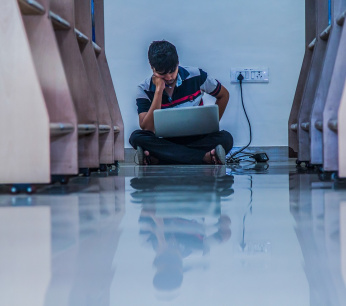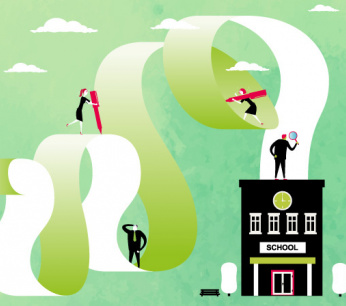A 'donation fund' for personal education
With small classes of sixteen students, founder Misha van Denderen put his eight secondary schools for personal education (Svpo) on the map. Less well known are the remarkable financial constructions and money flows within the growing network of public and private foundations, according to research by the Onderwijsblad.
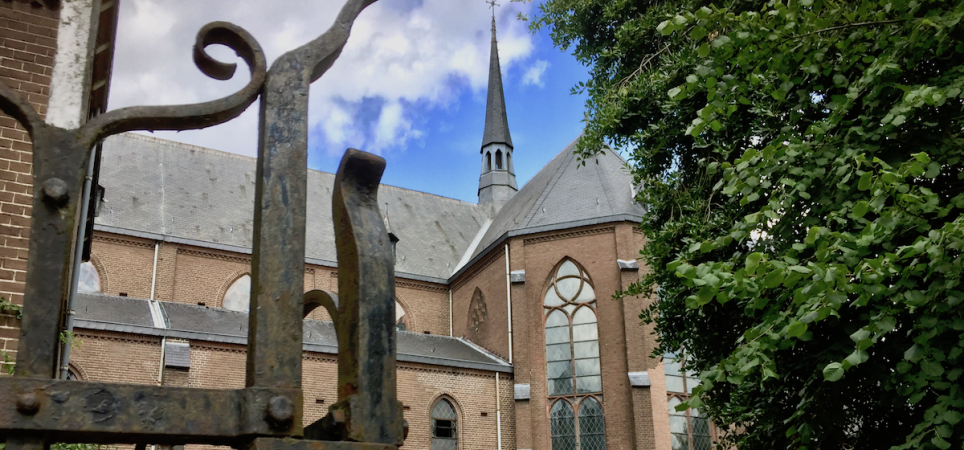
Image: Editors Education Magazine /AOb
On Friday, September 21, 2018, Misha van Denderen, then founder of five Svpo schools, is sitting at the notary's office in Olst opposite two representatives of the Roman Catholic parish of Saint Lebuinus. On the table is a deed of delivery for a church building with a parcel of nearly three thousand square meters. The former almshouse near the center of Deventer will be given a new owner and a new purpose. It will be renamed a school building, one of the three new Svpo schools that will be added this summer.
Van Denderen does not sign the deed on behalf of the school board, but on behalf of the Frederikssoon foundation, a personal vehicle registered at his private address and of which he is the sole director. For the agreed purchase price of 800 euros, six tons will come from the coffers of another private foundation that he chairs: the Foundation for Personal Education. That cash, managed by a three-headed board, is in turn filled with money from Svpo schools and from parents.
It is one of the remarkable financial constructions within the rapidly growing Svpo network of now eleven public and private foundations, all set up and chaired by one and the same person.
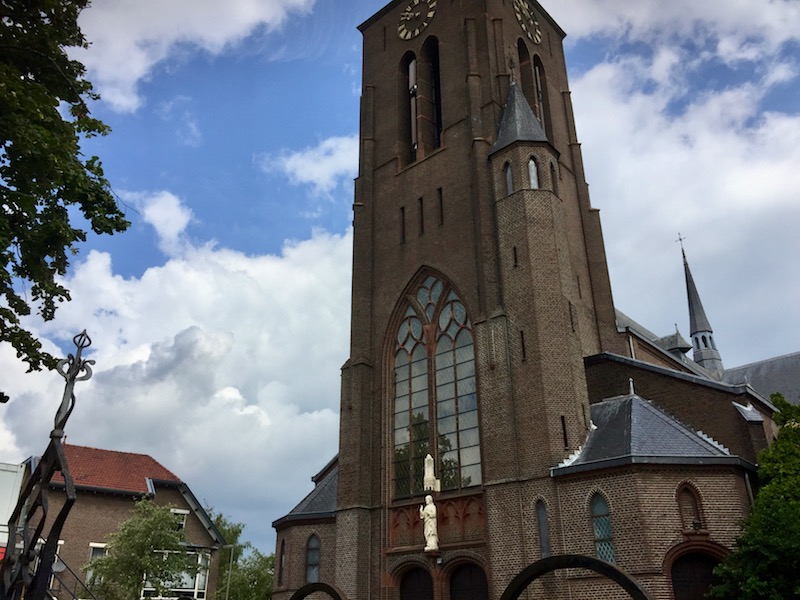
The Sacred Heart Church in Deventer. Image: Editors Education Magazine /AOb
1. Stormy growth
It once started at the kitchen table, at home with economist and philosopher Misha van Denderen. Together with his wife Suzan Polet, he philosophized about a different form of secondary education. Smaller, more 'scientifically based'. In the Zeeland town of Kapelle they opened their first School for personal education, nine years ago. Three years after Kapelle, the Frisian Hardegarijp followed in 2013. In the past few years, the school group has grown rapidly: in three years, six locations were added, bringing the counter to eight schools this summer.
Schools for personal education
2010: Chapel
2013: Hardegarijp
2016: Geldermalsen
2017: Amsterdam, Utrecht
2019: Hoorn, Deventer, Hengelo
The statutes include a range of possible denominations, from Catholic to Islamic, Jewish and evangelical brethren. Schools choose their ideological basis strategically, in line with the 'blank spots' in the intended location municipality. The construction of the network did not go without a struggle. Van Denderen entered a legal battle with the Ministry of Education, the Education Inspectorate and the municipality of Deventer.
The development of the school network did not go without a struggle. Van Denderen entered a legal battle with the Ministry of Education, the Education Inspectorate and the municipality of Deventer
Every new school is built on the same footing. A grade has five classes of sixteen students. They are taught four days a week from nine to five, teachers are also present all day. The staff at school has only three functions: a school leader, a janitor and teachers. The schools in Kapelle and Geldermalsen share their school leader, just like those in Utrecht and Amsterdam. The small overhead is one of the aspects that the board likes to convey: the money goes to the classroom.
The schools are apparently doing well. Almost without exception, the registrations exceed the available eighty places per grade. From regional newspapers to the national press, the schools enjoy a lot of positive publicity. An odd man out, a school that does manage to realize small classes. 'The schools are funded by the government, but offer education as if you were in an expensive private school,' says the Svpo website.
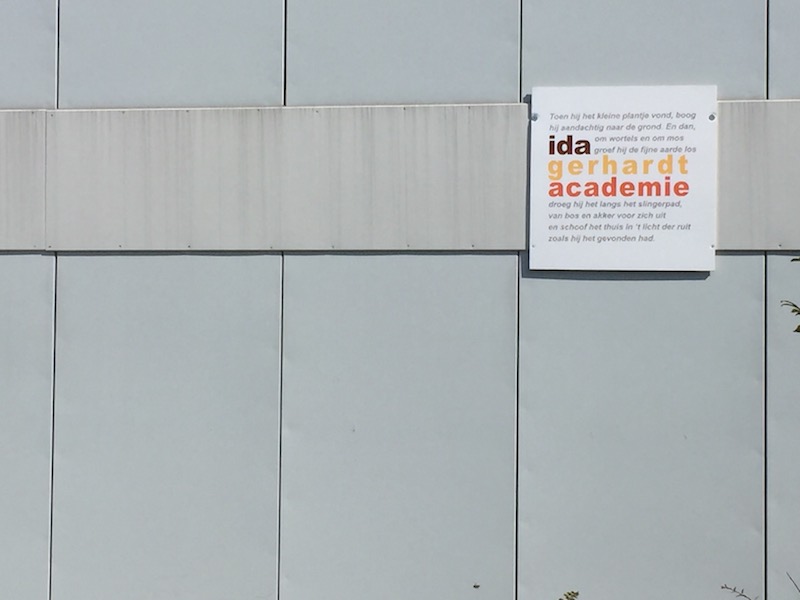
The Svpo school in Geldermalsen. Image: Editors Education Magazine /AOb
2. Couple
Chairman of the board Van Denderen and director Polet make it no secret that they are a married couple. They regularly perform together in interviews. For example, at the beginning of this year in NRC Handelsblad, about the trips they made with their families in 2013 and 2015 through South America and Africa. 'Their home, work, school and therefore also the compulsory education of their children, family and friends: twice they put their lives at home for a long time on hold to travel the world with their sons', wrote the newspaper.
In the 2017 annual report of the school in Hardegarijp, which Polet headed at the time, something is said about this: 'She is the wife of the chairman of the board, Mr Van Denderen, which can create an appearance of a conflict of interest.' Nevertheless, she was asked to temporarily take over the school management, the annual report continues, because as co-founder she had the necessary experience and could immediately take over the helm when the intended candidate dropped out.
The fact is that Polet has played an important role within the Svpo network since its inception. She acts as a daily point of contact for school leaders, who she trains herself, and she leads housing projects. At the same time, she also deals with matters that arise at a location. When the inspectorate comes to visit, Polet accompanies the inspectors together with the school leader. Then the Utrecht Participation Council last July had lost confidence in the board, the mr chairman was called the next day for an explanation. Not by chairman of the board Van Denderen, but by his wife.
When the Utrecht participation council had given up its confidence in the board last July, the mr chairman was called the next day for an explanation. Not by chairman of the board Van Denderen, but by his wife
Polet has been doing paid work since she set up the first school in Kapelle ten years ago. Between 2012 and 2014 she was hired through the Frederikssoon foundation, her husband's foundation, to set up the school in Hardegarijp. At the same time, Polet was himself chairman of the board of the Frisian education foundation during the same period. Van Denderen took over that gavel in June 2014 and adopted the first official annual report.
Since 2015, Polet has been formally on the payroll of the schools in Kapelle and Hardegarijp, both for half a job. In 2017, the remuneration - about sixty grand per half job, totaling more than 120 euros - for both part-time appointments was just above the institutional standard, the maximum of the Top Income Standards Act (Wnt). In 2018, this was still the case for one of the two appointments. Because the contract agreements had already been made earlier, the overrun is tolerated by the transitional law.
Decisions that could lead to a conflict of interest are taken by non-involved directors, Van Denderen responds. This means that the director concerned is not allowed to be present at the deliberation and decision-making. The other directors will therefore decide on the appointment of Suzan Polet and the conditions on which it will apply. Myself and Suzan almost without exception continue to work at home and we do that seven days a week. It is virtually impossible to recruit someone who wants to do the same amount of work. Because Suzan Polet works for each of the five schools, her salary should actually be calculated on a pro rata basis over each of the schools in 2018. In that case, however, she will have five employers, which is time-consuming and inconvenient in employment law. That is why it is limited to the two schools that are fully grown. '
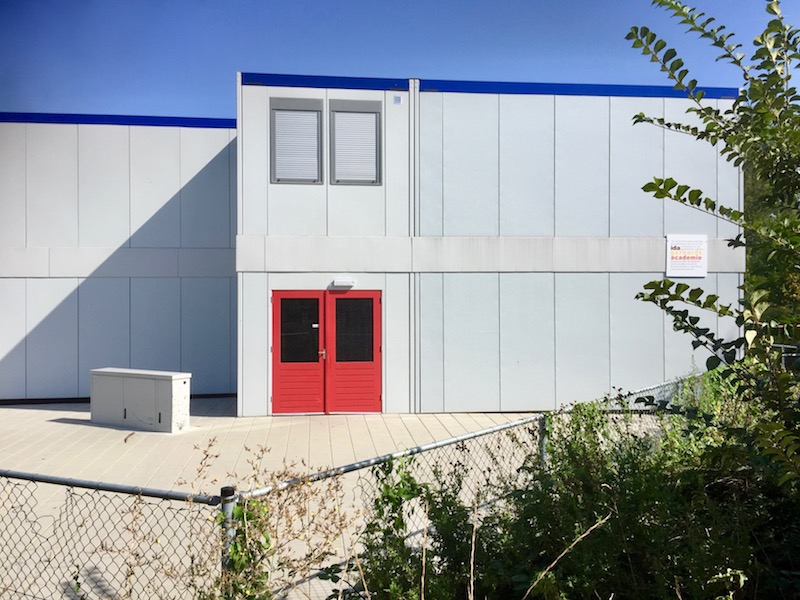
Ida Gerhardt Academy, the Svpo school in Geldermalsen. Image: Editors Education Magazine /AOb
3. Shared mailbox
The Schools for Personal Education do not fall under one umbrella administration, as usual. Each school is an independent, publicly funded foundation with its own board. As a result, all risks and liabilities are limited to one school and the network remains out of harm's way. At the time, the Ministry of Education demanded that new schools with different denominations be housed in separate foundations, says Van Denderen. According to him, the former administrative position of his wife should also be seen in this light around the start of the Frisian school.
Ultimately, the boards of all school foundations were aligned and composed of the same four people who have played a role in the network since the beginning. All unpaid, Van Denderen emphasizes with some regularity. The fourth board member acts as supervisor for all school boards. The schools, spread over six provinces, not only share the same administrators, but also their educational blueprint, the website and the same Amsterdam PO Box.
The eight publicly funded educational institutions, spread over six provinces, share the same Amsterdam PO Box with the private ANBI foundation for personal education
They also share this mailbox with the private foundation that Van Denderen set up to support the schools: the Foundation for Personal Education. A foundation that is legally separate from the educational institutions. The foundation has a three-headed board, of which two members also manage the schools. And a social objective, according to the statutes, to 'increase the chances of children to successfully complete their education in secondary education'.
According to Van Denderen, the foundation provides 'free' services to educational institutions, such as 'administration, research, ICT, software and curricula'. The income consists of 'gifts' from 'private persons' and schools that can do without something. Since 2011, almost three million euros has flowed into the cash via these two cash flows. Who are these generous donors?
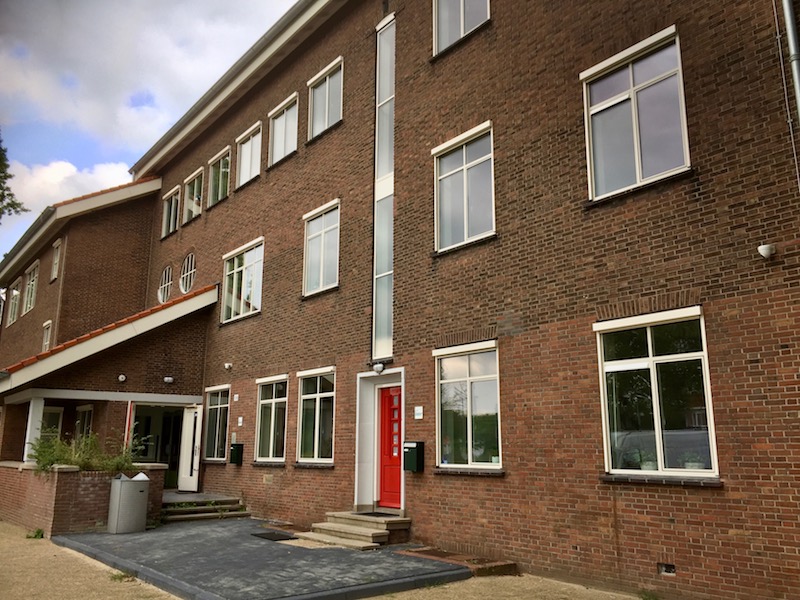
The Svpo school in Amsterdam-Noord. Image: Editors Education Magazine /AOb
4. "Gifts"
Every summer, parents receive a payment request for the school supplies of 200 euros and the voluntary parental contribution of 250 euros. According to the school guide, this parental contribution is used for language trips, excursions, sports days, projects and for various celebrations. Regarding voluntariness, which is legally enshrined in secondary education, the guide states: 'Payment of the parental contribution is not compulsory if your child does not participate in the activities.'
It sounds different in the annual payment requests to parents. 'In order to be able to purchase the school materials for your child on time, it is important that you transfer the total amount of 450 euros before 31 July 2019.' A link takes parents in the digital parent portal to an ideal payment order, in which the amount is entered. The account number does not belong to the school, but to the private Foundation for Personal Education. The emails state that this foundation manages the money.
In recent years, the schools also offered an alternative to the parental contribution: a donation agreement for a period of five years. The Foundation for personal education is known by the Tax and Customs Administration as a 'public benefit institution' (ANBI), or a good cause. A periodic donation to a charity is tax deductible.
'In that case, you can deduct the parental contribution from your tax annually, as a gift,' parents read in the emails. The donation amount of 250 euros was already preprinted in the enclosed form. The money also had to be received on time for this 'generous gift'. Please note: processing the grant agreement takes time. You must transfer the amount of 450 euros before 27 August 2018. The deeds will be processed later, ”said last year's payment request.
The tax authorities see such donations as a disguised, non-deductible parental contribution, according to a response from the Ministry of Finance.
The Tax and Customs Administration sees such donations as a disguised, non-deductible parental contribution, according to a response from the Ministry of Finance. “We do not go into specific examples. But in general I can say: a voluntary parental contribution is not deductible as a gift. The fact that it is called a gift does not detract from the fact that it is a parental contribution ”, said a spokesman, referring to a judgment of the Supreme Court. Even if parents sign a donation agreement for this? "If the gift is used for the same purpose as the parental contribution, it is a parental contribution." According to the ministry, the consequence may be that parents will receive an additional assessment if they are checked by the tax authorities.
For the new school year, the reference to the periodic donation appears to have been deleted from the payment emails. According to Van Denderen because of the 'limited enthusiasm'. The driver insists that parents have been properly informed. 'It is true that a parental contribution is not deductible. But the situation is different here. It is similar to X wanting to give a gift to Y and asking Y to donate an amount to charity instead. '
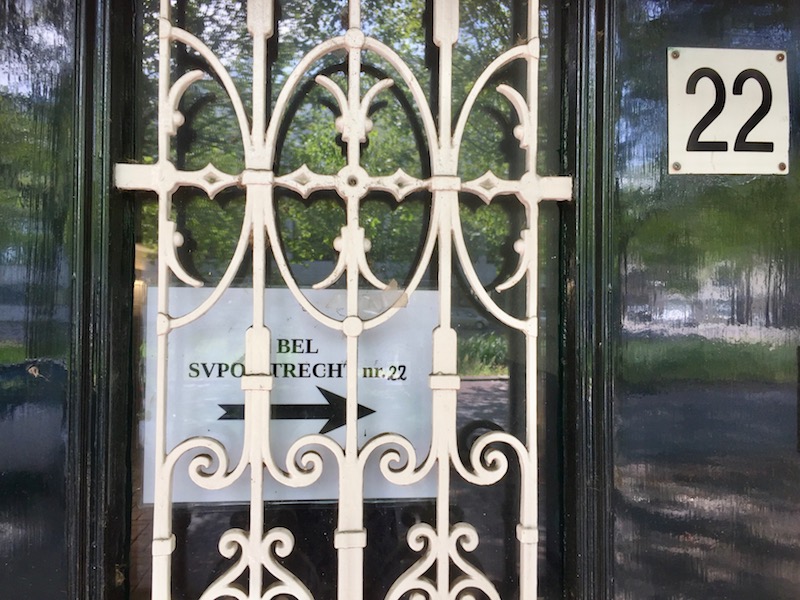
Svpo Utrecht on the Weerdsingel Westzijde. Image: Editors Education Magazine /AOb
5. Donor and recipient
Since 2011, more than 1,2 million euros has flowed from the parents in the greenhouse of the Personal Education Foundation. In 2018 alone, this amounted to 322 thousand euros. In the annual financial overview, the contributions of all 1290 parents - regular donation or not - are listed as a gift. Parents have no control over how it is spent.
'That is not allowed at all with a public benefit institution,' argues Van Denderen. 'If that were the case, it would no longer be a matter of' public benefit '. The foundation is therefore not an extracurricular organization and it is not set up or intended as such. '
Nevertheless, the Foundation for personal education also receives money from the Svpo schools. In this construction there is no remittance, as is the case with schools that fall under an umbrella administration. The Svpo schools use 'free' services and learning materials. 'Of course, a contribution may be made in the tip jar,' explains the ANBI foundation's website. As chairman of the school boards and the ANBI foundation, Van Denderen represents both the donor and the charity.
In the past four years, about 1,7 million euros flowed from Svpo schools to the foundation's treasury. How much money is involved per school cannot be found in the annual accounts of the school boards. The 'donations fund' is managed by the three directors who took the helm when it was founded twelve years ago. They decide how the foundation spends the money from parents and schools.
As chairman of the school boards and the ANBI foundation, Van Denderen represents both the donor and the charity.
Since 2011, the Foundation for personal education has spent around 320 euros hiring teachers in the schools. More than 170 thousand euros went to the recruitment of staff and students.
The chairman received an amount of 12.870 euros personally. 'A partial compensation due to the very high travel costs incurred in the four years 2013 to 2016', explains Van Denderen. According to him, these were related to visits to the first five schools. 'In addition, various long-term proceedings had to be conducted, for which the chairman of the board also had to give an appearance in various cities.' According to Van Denderen, as a director involved, he did not discuss the remuneration.
The vast majority of money has gone to housing projects in recent years. All in all, more than 1,6 million euros: 274 thousand euros was allocated by Svpo for a plot in Tytsjerksteradiel, 772 thousand euros for new construction in Geldermalsen, and six tons for a church in Deventer. 'High school buys Roman Catholic church', headed the regional newspaper above a news item.
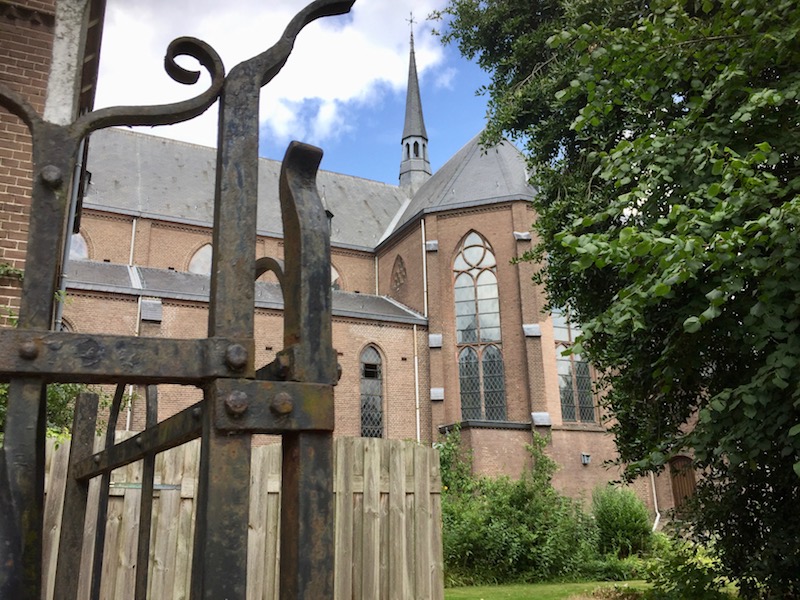
Side view of the Sacred Heart Church in Deventer. Image: Editors Education Magazine /AOb
6. Cash flows
The parish had already had the Heilig Hartkerk on Funda for almost three years when Van Denderen signed the purchase contract. His own Frederikssoon foundation became the new owner for eight tons plus fifty grand transfer tax. However, the first school year starts at the School for personal education in Deventer a little further on, in a different building. It was not possible to renovate the building on time, partly because the municipality stopped work for a while.
Educational accommodation will be decentralized, as has been laid down in an agreement with the municipality of Deventer. This means that the municipality transfers the budget and responsibility to the school board. That budget has been set at 378 euros per student per year. The money will be transferred in January for the school year in question, starting in 2020. According to a calculation by the municipal council, this would amount to 807.500 euros over the next six years. The costs for the purchase and renovation must initially be paid by the school out of 'own' pocket.
The church is made available to the school by his foundation, Van Denderen explains. 'This is done under conditions that are comparable to those with which otherwise (if there were no further decentralization) the municipality would provide housing. The school does not pay rent or otherwise. The building was made available free of charge. There is therefore certainly no question of a situation of conflict of interest. '
In 2012 Van Denderen founded the Frederikssoon foundation. In their own words to 'not be financially involved again' in the schools
In 2012 Van Denderen founded the Frederikssoon foundation. In its own words, the foundation should 'not be financially involved again' with the schools. He was in the run-up to the first school in Kapelle, partly with a loan he provided the school when government funding fell short. The schools in Hardegarijp and Geldermalsen borrowed a starting capital of 130 euros each through the Frederikssoon foundation. Both loans, at six percent interest, were repaid last year, according to the financial statements of the institutions.
The money flows between the private foundations themselves are uncontrollable for outsiders. They have not filed annual accounts with the Chamber of Commerce, which is not mandatory for many foundations. Since 2011, the Foundation for Personal Education has spent tons on the development of teaching materials, the electronic learning environment and ICT services. The foundations run on volunteers, but sometimes you have to buy in 'specialist knowledge', says Van Denderen. According to the director, that money went to 'external parties' who initially hired the foundation itself.
Since 2015, this money flow has been through his Frederikssoon foundation, he says, which would have received 3,5 tons from the ANBI foundation for this. Van Denderen states that he wants to answer all questions from the Education Magazine, but he does not provide the annual reports of his own foundation because, according to him, they contain privacy-sensitive information.

